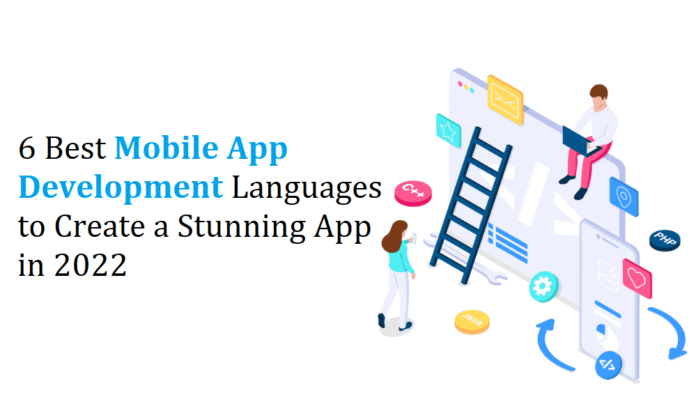With time and technology, the mobile application development industry is growing at a tremendous rate. According to the report of Statista, more than 5.7 million apps are available on the Android and iOS platforms combined. Today, almost every individual uses smartphone apps for personal and professional use.
The global chart for mobile applications is at its peak, creating a massive demand for mobile apps and mobile app developers. It enables excellent opportunities for freshers to learn top programming languages that can land them a job in a Mobile App Development Company.
With the increased demand and popularity for mobile applications, it becomes crucial for businesses to be aware of top mobile app development languages to take advantage of the best programming languages available for app development.
However, it raises the question of which programming language to learn and be aware of.
The answer is not straight but confusing, as nearly 9000 programming languages are available in the market. All the languages come with different features, characteristics, tools and frameworks.
So, selecting one that businesses can get an advantage of, becomes crucial.
But wait, we have figured out the list of top programming languages to help aspiring programmers and businesses grow.
Top Mobile App Programming Languages
There are many programming languages available in the market, and learning about the top languages can help you and your business in numerous ways. Read this article to learn about the top programming languages that can help you in stunning mobile app development.
Swift
Swift is the most popular general-purpose programming language for creating an iOS-based application. In 2014, Apple replaced Objective-C with the popular iOS programming language Swift.
It is a powerful, fast, safe and interactive language that helps you create incredible apps and software for iOS platforms such as macOS, iOS, tvOS and wearable OS devices.
Swift is an open-source platform which requires shorter and more reliable codes. Next, it makes projects easy to scale and expand. Plus, its error handling allows developers to have total control over unexpected failures.
It manages memory automatically and enables developers to focus more on the app’s logic and not worry about the objective.
Let’s discover its pros and cons to get a better understanding.
Pros
- In-build security features to avoid mistakes during the development of software.
- Take less space to ensure high-speed compilation and execution of the codes.
- Easy integration with Objective-C language.
- Easily scalable by making changes to the codes.
Cons
- Limited to iOS systems
- Not easy to integrate the apps into IDE and other tools.
Kotlin
Kotlin is a free, open-source, modern and general-purpose programming language inspired by different languages such as Java, C#, JavaScript, Scala and Groovy. It is used for server-side, client-side, web or android app development.
You can entirely interop Kotlin with Java, which means existing codes can be inserted from Java to Kotlin and Kotlin to Java naturally. Kotlin is a tool-friendly language, as it can be written in Java and converted to Kotlin using IDEs like IntelliJ, NetBeans, Eclipse, and others.
Kotlin is very expressive and concise as it helps developers express content in their codes. It cut down the coding by 40%, allowing developers to catch their errors in the code.
It uses static methods and variables, which helps developers not create the same boilerplate codes every time they use the same codes.
Moreover, the pros and cons of Kotlin will help you select the best-suited programming language.
Pros
- Increase the productivity of the developers
- Easily maintained because of IDE
- It is a Reliable programming language
- Easy to learn
Cons
- Limited resources to learn
- It can create some problems in the compilation process during development.
Java
Java is one of the most popular, reliable, and widespread programming languages developers use to create applications and software. It was developed by Sun microsystem and released in 1995.
Java is an open-source general-purpose programming language that uses a set of tools to enable cross-platform application development. It designs in a way that every system that supports a Java virtual machine(JVM) can run the code written in Java.
Java uses the object-oriented programming language(OOP) concept, which helps developers easily implement and maintain large Java codes. It enables you with the internet of things(IoT) and libraries that allow developers to use data and codes faster. Moreover, Java is secure, stable, cheap and economical to maintain.
Refer to the pros and cons of Java to know if it’s the best fit for you or not.
Pros
- Automatic garbage collection that removes excess memory and frees up space.
- Performs numerous tasks at once because of threads.
- Easy to use as its syntax is similar to C++, C# and more.
- Runs on multiple platforms, environments and browsers.
Cons
- Zero features to backup data.
- As Java runs on JVM(Java virtual machine ), it uses more memory.
Python
Python is a popular open-source programming language launched in 1991 by Guido van Rossum. It is the developer’s first choice for creating mobile applications, desktop applications, web development, hardware programming, and many more.
Python’s simplified syntax makes it easy to use and allows developers to efficiently write and manage codes faster than in other programming languages.
Python enables developers with hundreds of libraries and frameworks to save time and effort in the initial development process.
Most developers believe that python is one of the most efficient, reliable, and faster languages compared to other languages.
To further comprehend, let’s look into its pros and cons.
Pros
- Used for AI programming(artificial intelligence), Machine learning and IoT solutions.
- Support from multiple platforms and systems.
- Less complexity as each code runs individually.
- Coding is simple to understand.
Cons
- Needs a lot of RAM to perform
- Time of execution is slow
C#
C# enunciate as C sharp is an object-oriented and modern language developed by Microsoft in 2000. It is one of the great choices for developers to create Apps, software and games. It is a powerful language used for machine learning projects, data science projects, and hardware interfaces.
Since c# is the successor to C++ and a member of the .Net framework, it gets support from the other libraries. Developers also get benefits from .Net framework technologies like LINQ and lambdas.
C# comes with a garbage collection and it serves as an automatic memory manager, which manages the allocation and release of memory. Garbage collectors collect and dispose of the garbage memory to avail space for new allocations.
Look at the pros and cons of C# to determine if it is the right choice for you or not.
Pros
- Syntaxes are based on humanoid behaviours.
- Help programmers create Hybrid and Native mobile apps.
- Highly scalable as its static codes can be easily modified.
- The efficient syntax makes it easy to learn and fast to deploy.
Cons
- It can be difficult to learn for the freshers
- Getting support from the community is difficult.
Javascript
Javascript is one of the most used and popular programming languages of all time in the software development industry.
Javascript is lightweight, and object-oriented technology integrates with other frameworks and programming languages, allowing developers to build interactive websites, apps and games.
Javascript easily interacts with other frameworks like React, Angular, Native and Vue.js, allowing developers to create fast, simple and scalable apps with utmost performance. It also helps developers to build and manage web applications, web services and websites.
Additionally, knowing Javascript’s pros and cons can help you decide which programming language is appropriate for your Mobile App Development.
Pros
- The fastest way to create client-side parts(everything displayed in a web application).
- Easy to learn and understand because of simple syntaxes and functions.
- Works on both frontend and backend parts using NodeJS framework.
- It has support from all the major browsers.
Cons
- Not easy to make changes and updates.
- Hussle for developers due to highly sensitive standard syntaxes.
Conclusion
The high demand for Mobile App Development Services has created opportunities for developers to learn and gain experience in different programming languages. Various languages work with several frameworks and tools, making it necessary for developers to upgrade their skills.
The need for programming languages varies from person to person and business to business. It is about selecting the right programming language which helps both developers and businesses grow.
The developers interested in making their career in app development can select any of the above languages and work hard to master them. But on the other hand, businesses should spend time understanding their business objectives and needs and decide which technology to use to create an app that will help them make a stunning app, solve their customers’ problems, and help them grow.
















